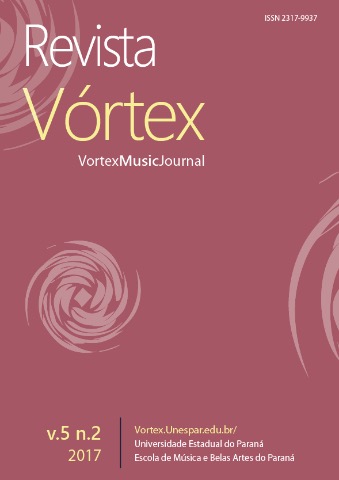moon chunks: creating musical meanings
DOI:
https://doi.org/10.33871/23179937.2017.5.2.2151Resumo
In literature studies several authors have been researching on how text (verbal) and image (visual) can relate to each other, and words like "synergy" and "imagetext" have been used in the attempt to describe the narrative discourse, which so often appear in picture storybooks. In musical research, narrative deals with several questions linked either to musical: perception, reception, composition or performance. The starting point of this investigation was Wie schmeckt der Mond? by Michael Grejniec, a children's picture book. This paper explores the way the book was written and illustrated, and how a new music orchestral piece moon chunks was composed. By focusing on specific compositional ideas, the piece was shaped to highlight different aims, and the musical narrative was used in a plural musical-verbal-visual interaction, in order that the new music language would better communicate with the younger audience. Conclusions were drawn from the analysis of the composer's own artistic practice and 8 interviews held with random children in the audience.Downloads
Referências
ALMEN, Byron. A Theory of Musical Narrative. Bloomington: Indiana University Press, 2008.
BARRETT, Margaret & STAUFFER, Sandra. Narrative Inquire: From Story to Method, in Barrett & Stauffer (eds), Narrative Inquire in Music Education. Springer, Australia & USA, pp. 7-17, 2009.
BERENSON, Frances. Interpreting the emotional content of music, in Krausz (ed.) The Interpretation of Music: Philosophical essays. Oxford: Oxford University Press, pp. 61-72, 1993.
BLAIR, Deborah. Musical Maps as Narrative Inquiry, in International Journal of Education & the Arts, volume 8 - Nº15, pp. 1-19, 2007.
BOWMAN, Waine. Why narrative? Why now?, Research studies in Music Education, 27, pp. 5-20, 2006.
DOONAN, Jane. Looking at Pictures in Picture Books. Stroud, England: Thimble Press, 1993.
ELLIOTT, David. Music Matters: A New Philosophy of Music Education. New York: Oxford University Press, 1995.
GREJNIEC, Michael. Wie schmeckt der Mond?. Zürich: Boehm Press, 1993.
KRAMER, Jonathan. The Time of Music: New Meanings, New Temporalities, New Listening Strategies. New York: Schirmer, 1988.
KIVY, Peter. Music Alone: Philosophical Reflections on the Purely Musical Experience. Ithaca: Cornell University Press, 1990.
LAVY, Mathew. Emotion and the Experience of Listening to Music: A Framework for Empirical Research. Unpublished PhD thesis, Jesus College, Cambridge, April 2001.
LEWIS, David. Reading Contemporary Picturebooks – Picturing Text. New York: Routledge-Falmer, 2001.
LEVINSON, Jerrold. Music as Narrative and Music as Drama. Mind & Language, 19 (4), pp. 428-41, 2004
MAUS, Fred. Music as Narrative, Indiana Theory Review, 12, pp.1-34, 1991.
MAUS, Fred. Music as Drama, in J. Robinson (ed), Music and Meaning. Cornell University Press, Ithaca and London, pp. 105-130, 1997.
MAUS, Fred. Classical Instrumental Music and Narrative, in James Phelan and Peter Rabinowitz (eds), A companion to Narrative Theory. Blackwell Publishing Ltd, UK, pp. 466-483, 2005.
MITCHELL, William. Picture Theory: Essays on Verbal and Visual Representations. Chicago: University of Chicago Press, 1994.
NEWCOMB, Anthony. Action and Agency in Mahler"™s Ninth Symphony, Second Movement, in J. Robinson (ed), Music and Meaning. Cornell University Press, Ithaca and London, pp. 131-153, 1997.
NODELMAN, Perry. Words About Pictures. The Narrative Art of Children"™s Picture Books. Athens: University of Georgia Press, 1988.
RUQUOY, Danielle. Situação de entrevista e estratégia do entrevistador, in Luc Albarello, Françoise Digneffe, Jean-Pierre Hiernaux, Christian Maroy, Danielle Ruquoy and Pierre de Saint-Georges (eds) Práticas e métodos de investigação em ciências sociais. Lisboa: Edições Gradiva. pp. 84-116, 1997.
SIPE, Lawrence. How Picture Books Work: A Semiotically Framed Theory of Text-Picture Relationships, in Literature and Education, 29 (2), pp. 97-108, 1998.
WALTON, Kendall. Listening with imagination: Is music representational?, in J. Robinson (ed), Music and Meaning. Cornell University, New York, pp. 57-82, 1990.
WEBSTER, Leonard & MERTOVA, Patricie. Using Narrative Inquiry as a research method. London and New York: Routledge, 2007.
Downloads
Publicado
Como Citar
Edição
Seção
Licença
Copyright (c) 2017 Sara Carvalho

Este trabalho está licenciado sob uma licença Creative Commons Attribution 4.0 International License.
Autores mantêm os direitos autorais e concedem à revista o direito de primeira publicação, com o trabalho simultaneamente licenciado sob a Licença Creative Commons Attribution que permite o compartilhamento do trabalho com reconhecimento da autoria e publicação inicial nesta revista.






